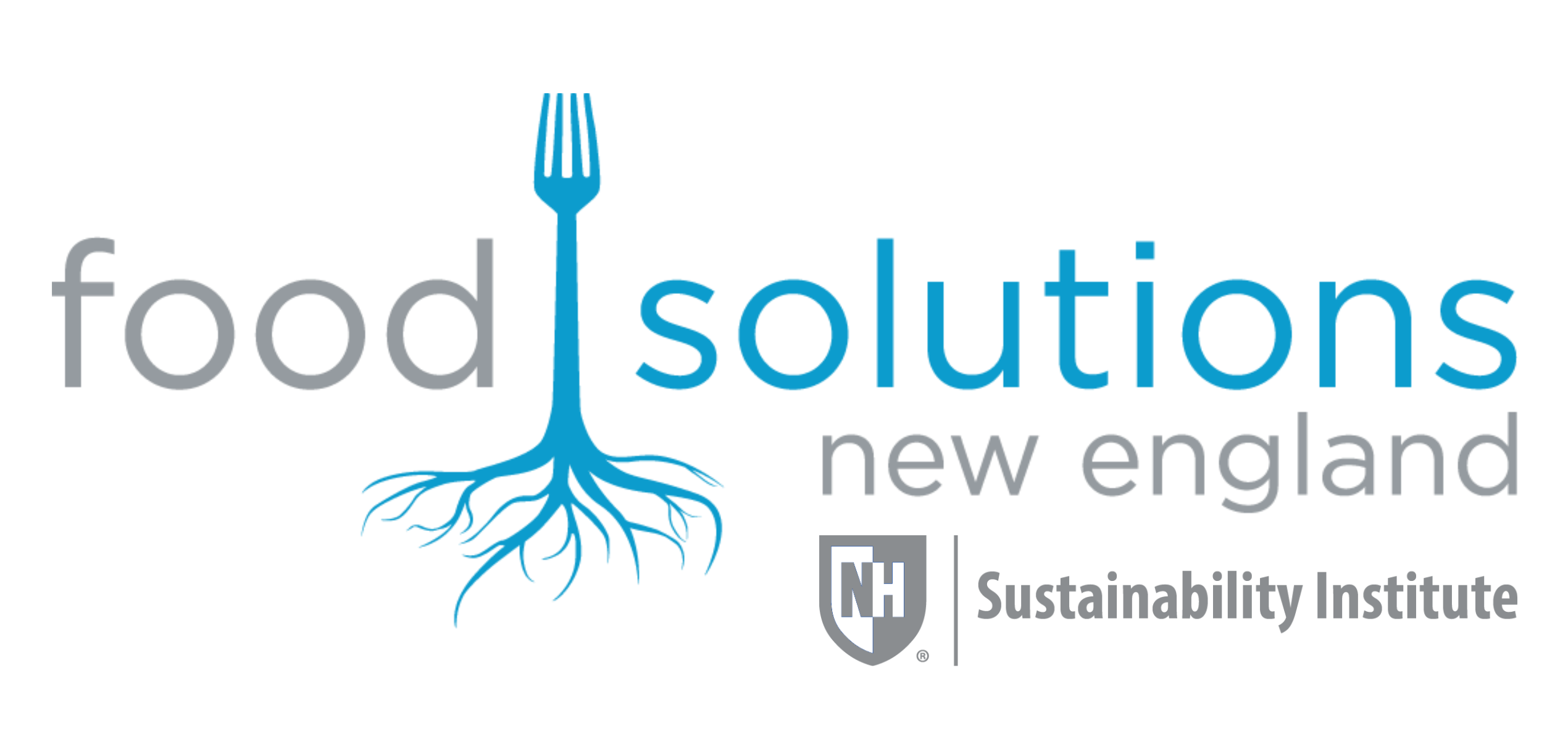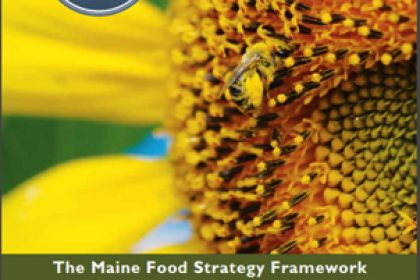
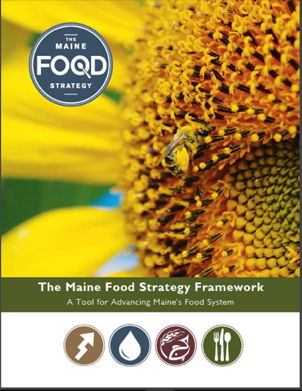 On Tuesday, August 9 the Maine Food Strategy, a statewide initiative to create a stronger and more broadly connected food system, released the Framework: A tool for advancing food systems in Maine. This document is based on years of input from stakeholders across many platforms who identified priorities particularly important to the future of Maine’s food system. The Framework offers a model to focus and coordinate individuals and groups working towards widespread food systems change.
On Tuesday, August 9 the Maine Food Strategy, a statewide initiative to create a stronger and more broadly connected food system, released the Framework: A tool for advancing food systems in Maine. This document is based on years of input from stakeholders across many platforms who identified priorities particularly important to the future of Maine’s food system. The Framework offers a model to focus and coordinate individuals and groups working towards widespread food systems change.
Find the document at www.mainefoodtrategy.org as well as other materials to engage with the network.
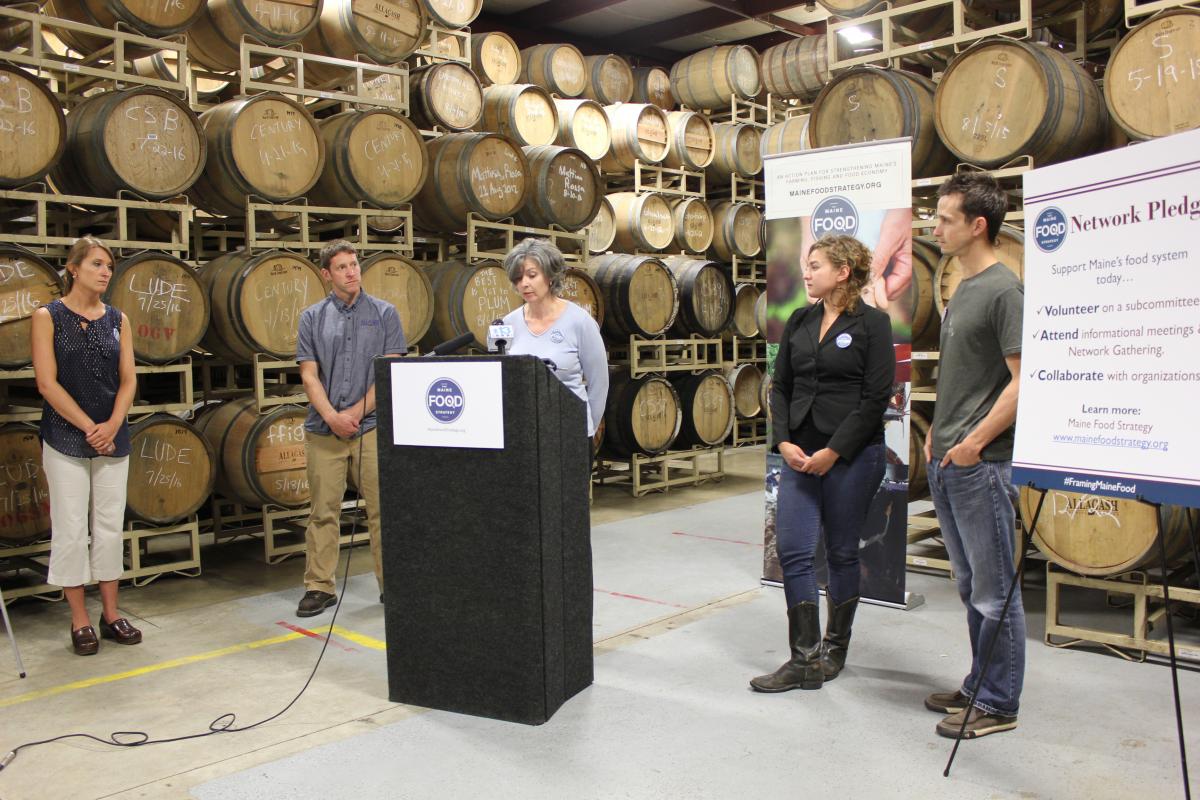
The press event was held at Allagash Brewing Company, a Maine-based beer company that sells nationally. The connection was made to the MFS Framework because as part of their business model, they have made environmental practices and local purchasing ingrained. Head brewmaster Jason Perkins spoke on behalf of the company, “The stronger the agricultural output of Maine, the more ingredients we can use in our beer, the more we can support Maine farmers and growers.” Allagash shows that great success can be had while still considering the environment and diverse economy of the state.
To create the Framework document, stakeholder input was synthesized into five goal areas. These goals focus on ways to:
- Achieve annual market growth in a sustainable manner
- Improve the ability of businesses across the food production supply chain to manage marketplace growth and change
- Increase incomes and access to benefits for food supply workers
- Promote public policies that support farms, fisheries and other food production supply chain businesses
- Ensure food insecure individuals have access to resources that address their needs
These goals aim to expand markets for local food, and make it easier for all people to access it. If that sounds familiar, it is because it is right along the lines of the New England Food Vision. The 50by60 goal is an achievable one through the actions of individual states and the region. The Framework document is Maine’s contribution to continue that process and grow our food economy and feed our people.
The Framework document also contains other important pieces: a Partners section and a Measures section. The Partners document offer a starting point for working together collaboratively. Food systems organizations were asked to share whether their current work aligns with any of the document’s goals. This section can then be used to identify prospective partners working on the same goals, or to identify gaps where current work toward the goals is not happening. Organizations not represented in this document are asked to expand the network and provide their information through the MFS website.
The Measures section can be used to track change and progress towards the goals over time. Links to credible, currently tracked data is provided for each goal area. Additional data sources are welcome, and can be submitted through the MFS website.
Steering committee members and representatives of both agriculture and fisheries sectors were present at the release event, and they noted the importance of solving problems through a big-picture lens, not a singular one. “We need to look at the entire food system, and the Maine Food Strategy’s Framework is a blueprint to create long-term change,” said Sara Trunzo, director of a food-bank farm in Unity, Maine. Building a strong economies and connecting networks to expand markets for local food were present in the comments. Josh Stoll, coordinator of a fisheries support network, discusses the usefulness of networks and collaborations across sectors. “This is a pivotal moment in time, an opportunity to find new ways to strengthen our food supply chain and the Framework is the model that can get us there.”
The Framework can be seen as an organizing tool; a roadmap to focus collective work. Food Solutions New England is similarly looking to do this on a regional scale, coalescing the efforts across New England to create effective and positive food system change. Food system networks at all scales can benefit from effective information sharing and the creation of collaborative working relationships. Defining common goals and a shared agenda can help to convene those relationships. The tangible goals that the MFS Framework highlights are supportive of regional goals outlined in the New England Food vision. Together, as individual states and as a New England Region, collaborative effort and shared goals have to power grow and expand participation in food systems work, and facilitate positive food systems change.
About the Maine Food Strategy
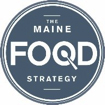 The Maine Food Strategy is an initiative to bring together interests across the state to advance goals and objectives that strengthen the food system in Maine now, and in the future. The initiative is advised by a volunteer Steering Committee and accomplishes its work through the support and involvement of people and organizations working in and on food systems in the state. The Maine Food Strategy is fiscally sponsored by Third Sector New England and can be found online at www.mainefoodstrategy.org, on Facebook and Twitter at @MEFoodStrategy.
The Maine Food Strategy is an initiative to bring together interests across the state to advance goals and objectives that strengthen the food system in Maine now, and in the future. The initiative is advised by a volunteer Steering Committee and accomplishes its work through the support and involvement of people and organizations working in and on food systems in the state. The Maine Food Strategy is fiscally sponsored by Third Sector New England and can be found online at www.mainefoodstrategy.org, on Facebook and Twitter at @MEFoodStrategy.
